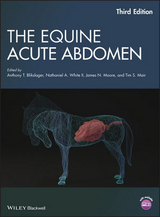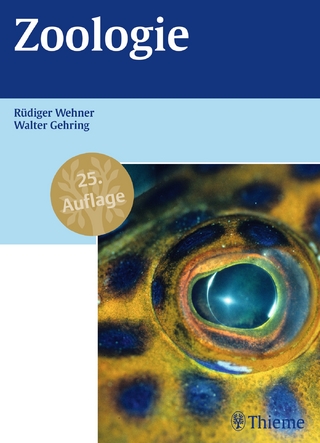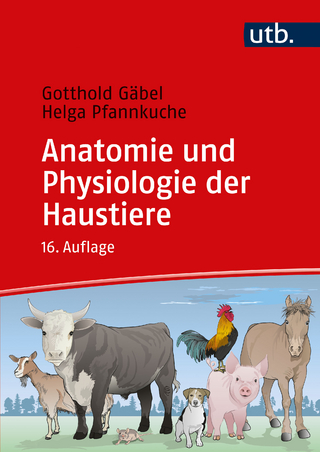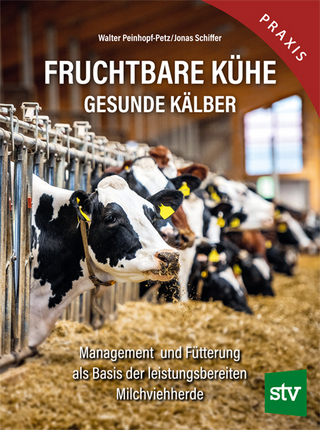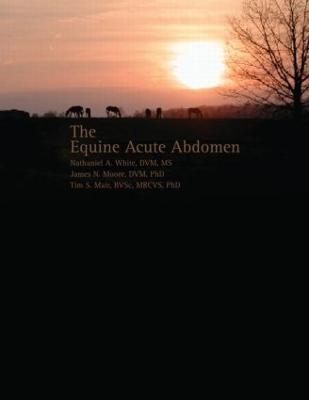
Equine Acute Abdomen
Teton NewMedia (Verlag)
978-1-59161-029-8 (ISBN)
This title allows users to effectively diagnose and treat any acute disease of the stomach, intestines, peritoneum, liver and abdominal wall. Its authorship includes over 20 internationally recognized experts that provide critical information needed by practitioners for management of abdominal diseases. This informative resource provides a thorough discussion of normal and abnormal anatomy and physiology. Surgical techniques are broken down into an easy to read step-by-step format. This highly visual presentation, over 410 illustrations, is a necessary edition to an equine practitioner's library. This title is published by Teton New Media in the USA and distributed by Manson Publishing outside of North America.
Nathaniel A. White, James N. Moore, Tim S. Mair
Contents Part 1. Normal Anatomy and Physiology Chapter 1 Gross and Microscopic Anatomy of the Equine Gastrointestinal Tract Thomas M. Krunkosky, Carla Jarrett, and James N. Moore Esophagus 5 Esophagus-Stomach Junction 7 Stomach 7 Stomach-Small Intestine Junction 11 Small Intestine 11 Large Intestine 14 Liver 17 Spleen 18 Pancreas 19 Chapter 2 Physiology of the Digestive Tract Gastric Secretory Function - Michael J. Murray 22 Small Intestine Function - David E. Freeman 25 Digestive Physiology - Anatomy 25 Intraluminal Digestion 28 Absorption of Ions and Water 29 Absorption of Carbohydrate, Protein and Fat 32 Iron Absorption 33 Calcium and Magnesium Absorption 34 Intestinal Secretion 35 Motility 36 Control of Motility 37 Function of the Ileum 38 Large Bowel Function - Marco A.F. Lopes 41 Motility Patterns and Transit of Contents 41 Microbial Activity and Fermentation 42 Secretion and Absorption 45 Liver Function - Tim S. Mair 54 Bile Acid Metabolism and Excretion of Bile 54 Protein Metabolism 54 Carbohydrate Metabolism 55 Lipid Metabolism 55 Detoxification and Drug Metabolism 56 Storage 56 Chapter 3 Effects of Feeding on Equine Gastrointestinal Function or Physiology Marco A.F. Lopes Feeding Grain 58 Feeding Lush Grass 62 Replacing Grain With Fat 62 Feeding Mature Grass and Poor Quality Hay 62 Feeding Large Meals Intermittently and Fasting 62 Chapter 4 Intestinal Motility and Transit Peter C. Rakestraw Physiology of Normal Motility 68 Pathophysiology of Ileus 80 Treatment of Motility Disorders in the Horse 82 Part 2 Pathophysiology of Gastrointestinal Diseases Chapter 5 Pathophysiology of Gastric Ulcer Disease Michael J. Murray Gastric Ulcer Disease 96 Chapter 6 Pathophysiology of Gastrointestinal Disease: Obstruction and Strangulation Anthony T. Blikslager Simple Obstruction 100 Strangulating Obstruction 101 Intestinal Reparative Mechanisms 107 Chapter 7 Prevention and Treatment of Postoperative Intraabdominal Adhesions in Horses P.O. Eric Mueller Current Concepts in Pathophysiology of Adhesion Formation 119 Diagnosis of Intraabdominal Adhesions 120 Current Concepts in Prevention of Adhesion Formation 121 Separation of Adhesiogenic Surfaces 122 Treatment of Intraabdominal Adhesions 125 Adhesion Prevention Strategies 125 Chapter 8 Pathophysiology of Peritonitis John F. Peroni Anatomy and Physiology of the Peritoneum 130 Etiology of Peritonitis 131 Clinical Presentation 131 Diagnostic Approach 132 Chapter 9 Pathophysiology of Enteritis and Colitis Harold C. McKenzie Inflammation 136 Pain 137 Ileus 137 Hypermotility 137 Hypersecretion 138 Osmotic Diarrhea 138 Decreased Absorption 138 Endothelial Dysfunction 138 Specific Diseases 138 Chapter 10 Malabsorption Syndromes Tim S. Mair and Thomas J. Divers Causes of Malabsorption Syndrome 148 Clinical Signs 155 Diagnosis 156 Treatment 158 Chapter 11 Liver Diseases and Liver Failure Tim S. Mair and Thomas J. Divers Causes of Liver Disease 162 Diagnosis of Liver Disease 165 Hyperlipemia 167 Theiler's Disease (Serum Hepatitis) 174 Other Causes of Acute Hepatic Disease and Failure in Adult Horses 178 Pyrrolizidine Alkaloid Intoxication 178 Cholangiohepatitis and Choledocholithiasis 182 Other Biliary Conditions 185 Chronic Active Hepatitis 185 Klein Grass (Panicium Coloratum) Toxicity 186 Alsike Clover Toxicity 186 Hepatic Neoplasia 187 Hepatic Amyloidosis 187 Iron Overload, Hemochromatosis 187 Right Hepatic Lobe Atrophy 188 Chapter 12 Systemic Inflammatory Response Syndrome: Endotoxemia Reconsidered Clare E. Bryant and James N. Moore Responses to Pathogen-Associated Molecular Patterns 192 Receptors for Gram-Negative Bacteria and Bacterial Ligands 193 Receptors for Gram-Positive Bacteria and Bacterial Ligands 195 Systemic Inflammatory Response Syndrome 196 Inflammatory Mediators and Their Source in the Horse 197 Part 3. Intestinal Parasitism Chapter 13 Intestinal Parasitism Christopher J. Proudman Principles of Iintestinal Parasitism 204 Strongylus Vulgaris 204 Cyathostomins 207 Tapeworms 208 Parascaris Equorum 210 Other Intestinal Parasites 211 Prevention 211 Part 4. Epidemiology Chapter 14 Epidemiology of Colic Noah D. Cohen General Epidemiologic Considerations 218 Incidence of Colic 222 Factors that Predispose to Colic 222 Factors Indicating the Need for Surgical Management of Colic 225 Frequency of and Factors Associated with Survival from Colic and Colic Surgery 226 Study of Colic Problems in Individuals and Herds 228 Part 5. Diagnosis Chapter 15 Diagnosis of Gastrointestinal Disease Emma L. Rowe and Nathaniel A.White Signalment 236 History 237 Physical Examination 238 Hematology, Blood Gases, and Serum Biochemistry 270 Ultrasonography 271 Radiographs 276 Endoscopy 278 Laparoscopy 280 Fecal Examination 280 Transit Time 281 Exploratory Laparotomy 281 False Colic 281 Decision for Surgery 282 Part 6. Medical Management Chapter 16 Medical Management of Gastrointestinal Diseases Tim S. Mair Analgesia 292 Choice of Analgesics in Colic 297 Treatment of Intestinal Spasm and Spasmodic Colic 298 Treatment of Obstruction 298 Treatment of Flatulence and Tympany 302 Treatment of Ileus 303 Chapter 17 Treatment of Shock Kevin T. T. Corley Support of the Cardiovascular System 310 Fluid Therapy 310 Acid Base Balance 312 Types of Fluid 316 Oral Fluids 324 Delivery Systems 326 Recognition of Hypovolemia and Dehydration 327 Treatment Strategies 329 Chapter 18 Treatment of Endotoxemia Kevin T. T. Corley and Gayle D. Hallowell Drugs that Bind or Block Endotoxin 338 Anti-Inflammatory Agents 340 Modulation of the Coagulation System 342 Drugs Affecting Intracellular Metabolism 344 Chapter 19 Treatment of Peritonitis John F. Peroni Medical Treatment 352 Interventional Treatment 352 Complications and Prognosis 354 Chapter 20 Diagnosis and Treatment of Enteritis and Colitis in the Horse Harold C. McKenzie Diagnosis 356 Specific Syndromes 356 Treatmen 360 Supportive Therapies 360 Specific Therapies 366 Surgery 369 Specific Diseases 370 Chapter 21 Nonsurgical Management of Nephrosplenic Entrapment of the Large Colon Joanne Hardy Clinical Presentation 383 Diagnosis 383 Nonsurgical Correction 385 Complications and Prognosis 387 Prevention of Recurrence 387 Chapter 22 Colic in the Foal Martin O. Furr Abdominal Radiography 391 Gastroendoscop 393 Ultrasonography 393 Abdominocentesis 394 Case Synthesis and Management 395 Surgical Treatment 396 Gastroduodenal Ulceration 397 Small-Intestinal Obstruction 397 Large-Colon Obstruction 397 Atresia 398 Part 7. Nutritional Management Chapter 23 Nutritional Management of the Colic Patient Ray J. Geor Rationale for Early Initiation of Nutritional Support after Colic and Intestinal Surgery 404 Estimating Nutrient Requirements 405 Modes of Nutritional Therapy 406 Feeding Management of Specific Gastrointestinal Conditions 412 Part 8. Anesthesia for Abdominal Surgery Chapter 24 Anesthesia for Horses with Colic Cynthia M. Trim Preanesthetic Assessment 420 Anesthetic Agents 421 Induction of Anesthesia 422 Maintenance of Anesthesia 422 Anesthetic Agents in Foals 424 Monitoring 424 Cardiovascular Support 428 Hypercapnia and Hypoxemia 434 Airway Management 435 Recovery from Anesthesia 436 Anesthesia for Surgery in the Standing Horse 437 Part 9. Surgery for Acute Abdominal Disease Chapter 25 Preparation of the Patient David E. Freeman Patient Preparation 444 Antiseptics Agents 445 Draping the Surgery Site 446 Chapter 26 Surgical Exploration and Manipulation David E. Freeman Ventral Midline Incision 452 Inguinal Approach 454 Flank Laparotomy 455 Alternative Approaches 455 Abdominal Exploration 456 Examination and Handling of Small Intestine 468 Examination and Handling of Large Intestine 469 Special Circumstances 470 Intestinal Placement 472 Chapter 27 Surgical Techniques David E. Freeman Surgical Team 474 Surgical Environment and Equipment 475 Gowns, Drapes and Accessories 476 Decompression and Drainage 477 Laparotomy Sponges 482 Surgical Instruments and Suture 482 Stapling Instruments 485 Miscellaneous Instruments 489 Surgical Procedures in the Small Intestine 489 Chapter 28 Intestinal Viability David E. Freeman Small Intestine 502 Large Colon and Cecum 509 Small Colon 510 Chapter 29 Large-Colon Enterotomy, Resection and Anastomosis Joanne Hardy Large-Colon Enterotomy 514 Large Colon Resection 516 Chapter 30 Small Intestinal Resection and Anastomosis David E. Freeman Extent of Resection 522 Resection of Mesentery 522 Decompression 522 Resection and Anastomosis 523 Stoma Size 525 End-to-End Anastomosis 527 Stapled Jejunojejunostomy 528 Everted Triangulated Stapled Anastomosis 530 Stapled versus Handsewn Anastomoses for Jejunojejunostomy 530 Jejunoileostomy 531 Jejunocecal and Ileocecal Anastomoses 532 Pelvic Flexure Colotomy 536 Chapter 31 Abdominal Closure David E. Freeman Closure of the Peritoneum 540 Linea Alba Closure 540 Techniques and Principles 543 Subcutaneous Closure and Skin 544 Incisional Dressing 545 Recovery Stall 545 Abdominal Bandages 545 Postoperative Care 546 Healing of the Equine Linea Alba 546 Special Circumstances 547 Secondary Closure 548 Part 10. Intensive Care and Postoperative Care Chapter 32 Monitoring Treatment for Abdominal Disease Tim S. Mair and Thomas J. Divers Frequency of Examinations 554 Physical Examinations 554 Monitoring Clinical Pathology Parameters 560 Chapter 33 Postoperative Complications Christopher J. Proudman Postoperative Colic 564 Postoperative Ileus (POI) 565 Jugular Thrombosis and Thrombophlebitis 566 Incisional Infection 568 Incisional Hernia Formation 569 Adhesions 570 Laminitis 572 Part 11. Specific Diseases Chapter 34 Diseases of the Stomach Michael J. Murray Gastric Ulcer Syndromes 578 Gastric Impaction 582 Gastric Dilation 583 Neoplasia 583 Chapter 35 Liver Diseases In Foals Tim S. Mair and Thomas J. Divers Portosystemic Shunts 586 Tyzzer's Disease 586 Equine Herpes Virus 1 Hepatitis 588 Liver Failure in Foals after Neonatal Isoerythrolysis 588 Umbilical Vein Abscess Affecting the Liver 589 Portal Vein Thrombosis 589 Hyperammonemia of Morgan Foals 590 Bile Duct Obstruction 590 Toxic Hepatopathy 591 Chapter 36 Diseases Of The Small Intestine David E. Freeman Strangulating Obstruction 594 Nonstrangualting Obstruction 605 Inflammatory and Infiltrative Diseases 610 Chapter 37 Diseases of the Cecum; Cecocecal and cecocolic intussusception James N. Moore and Joanne Hardy Cecal Tympany 618 Cecal Impaction 619 Cecocecal and Cecocolic Intussusception 622 Chapter 38 Specific diseases of the large colon Joanne Hardy Large-Colon Tympany 628 Large Colon Impaction 628 Sand Impaction 631 Enterolithiasis 633 Large-Colon Displacement 634 Other Simple Obstructions of the Large Colon 639 Large-Colon Torsion/Volvulus 639 Right Dorsal Colitis 642 Mural Infarction (Thromboembolic Colic) 644 Other Strangulating Lesions of the Large Colon 644 Chapter 39 Disorders of the Small Colon John F. Peroni Surgical Considerations Affected by Anatomic Features of the Small Colon 650 Obstructive Lesions 651 Vascular and Strangulating Lesions 656 Chapter 40 Vascular and strangulating lesions Peter C. Rakestraw Anatomy 660 Etiology and Prevention 660 Location and Classification of Rectal Tears 660 Clinical Signs and Diagnosis 662 Emergency Management 663 Medical Management 664 Surgical Management 665 Temporary Indwelling Rectal Liner 665 Loop Colostomy 666 Primary Repair 671 Nonvisual Direct Suturing Per Rectum 671 Ventral Midline Exposure and Antimesenteric Enterotomy for Suture Repair 673 Prognosis and Recommendations 674 Chapter 41 Colic and Pregnancy Elizabeth M. Santschi Colic during Pregnancy 678 Colic in the Peripartum Period 683 Chapter 42 Colic From Alternative Systems - "False Colics" Tim S. Mair Pain Associated with the Female Reproductive Tract 689 Pain Associated with the Male Reproductive Tract 695 Pain Associated with the Urinary Tract 695 Liver Diseases 697 The Pancreas 697 The Spleen 698 Pain Associated with the Respiratory Tract 698 Pain Associated with Cardiovascular Disease 700 Pain Associated with the Musculoskeletal System 700 Chapter 43 Abdominal Injuries John F. Peroni Diagnostic Approach 704 Treatment 707 Chapter 44 Laminitis Associated with Acute Abdominal Disease James K. Belknap and Andrew H. Parks Pathogenesis 710 Clinical Presentation 716 Treatment 719 Index 731
| Erscheint lt. Verlag | 31.10.2009 |
|---|---|
| Verlagsort | Jackson |
| Sprache | englisch |
| Maße | 215 x 279 mm |
| Gewicht | 1973 g |
| Themenwelt | Naturwissenschaften ► Biologie ► Zoologie |
| Veterinärmedizin ► Pferd | |
| Weitere Fachgebiete ► Land- / Forstwirtschaft / Fischerei | |
| ISBN-10 | 1-59161-029-X / 159161029X |
| ISBN-13 | 978-1-59161-029-8 / 9781591610298 |
| Zustand | Neuware |
| Haben Sie eine Frage zum Produkt? |
aus dem Bereich
